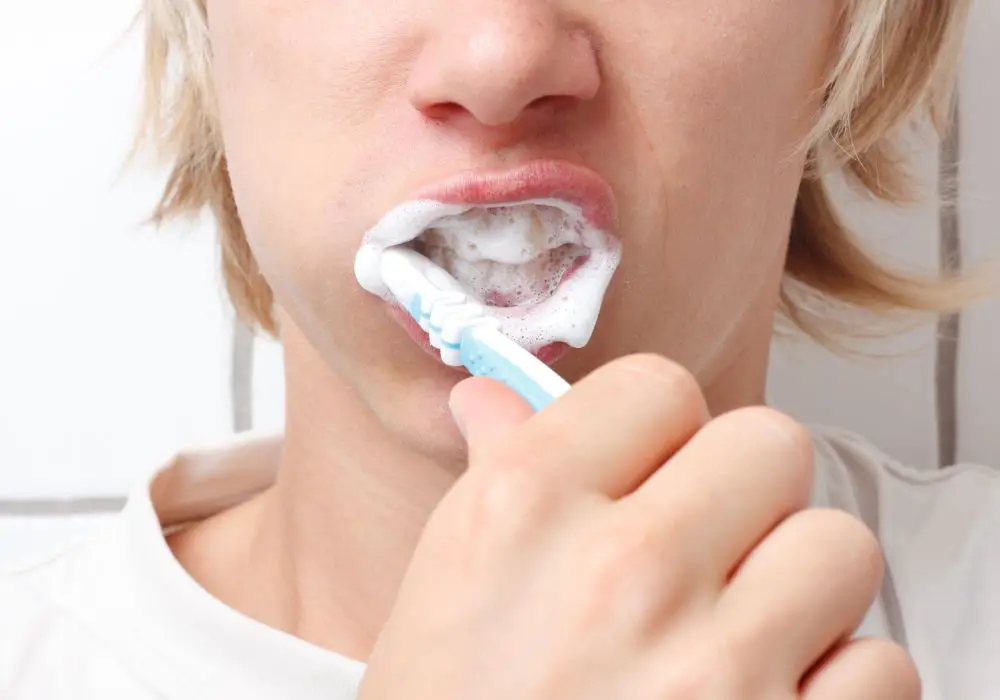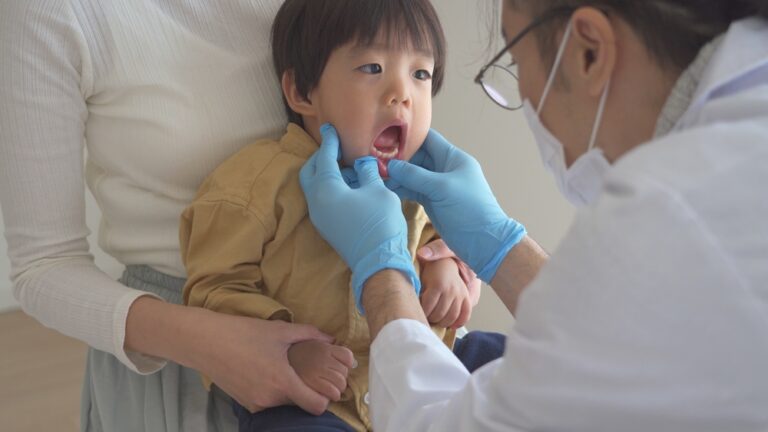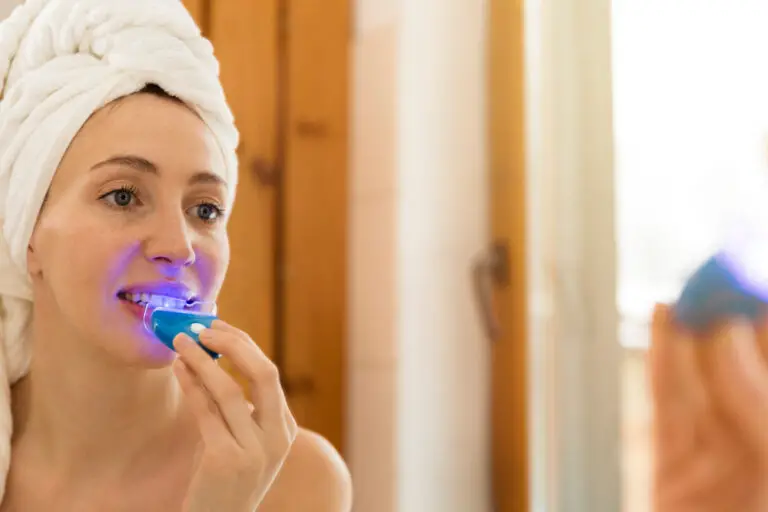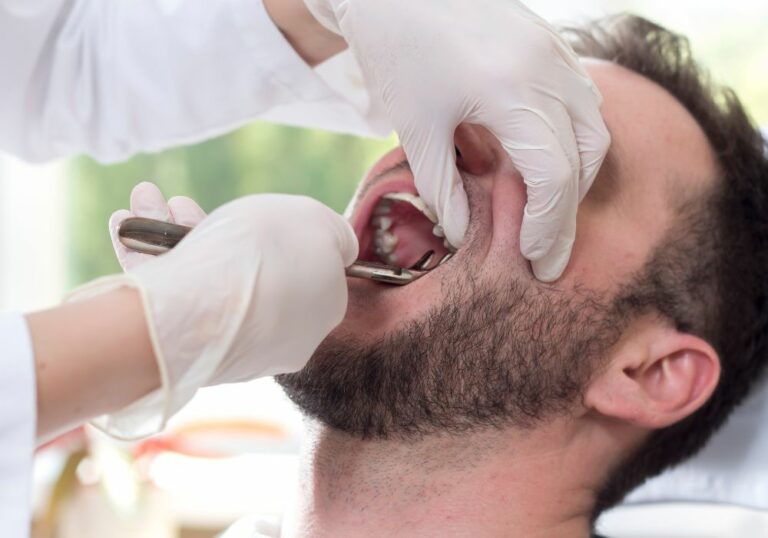What causes gagging or retching when brushing teeth?
Gagging or retching when brushing teeth is an involuntary reaction that can occur for a variety of reasons. Here is more detail on some of the most common causes:
Gag reflex sensitivity
Some people simply have a more sensitive gag reflex than others. The gag reflex is a normal protective mechanism that prevents choking and damage to the airway. When the reflex is triggered, it leads to involuntary gagging or retching.
The gag reflex is stimulated when the back of the throat is touched, either by an object or by the motion of the brush on the tongue and mouth. Those with an extra sensitive gag reflex don’t need much stimulation of the back of the mouth to elicit a gag response.
Dentists can actually measure gag reflex sensitivity using the so-called “Gagging Severity Index.” Based on how far back a dental tool can go before gagging occurs, dentists classify the reflex as mild, moderate or severe. Those at the severe end of the spectrum are more prone to frequent brush-induced gagging.
Brushing too far back on the tongue
The tongue extends quite far back into the mouth, beginning at the tip inside the lips and attaching near the throat. Bristles sweeping across the surface of the tongue during brushing can overstimulate and trigger gagging.
It’s vital to brush the tongue to remove bacteria buildup. But focusing brushing on just the front 2/3 of the tongue rather than thrusting far into the throat can help reduce gag stimulation. Using a tongue scraper may be tolerated better than a bristled brush by those gag sensitive.
Bad taste triggers
Many find the foaming agents and flavors in toothpaste to be unpleasant or too strong, especially first thing in the morning with morning breath. The minty tingle of toothpaste or chemical taste of mouthwash can be sudden taste sensitivities that instigate gagging when the brush is in the mouth.
Switching to a toothpaste for sensitive teeth that is SLS-free may help curb the bad taste. Using less toothpaste, a blander tasting one, or diluting mouthwash with water are other remedies. Brushing with just water is an option as well if taste is a major factor.
Oversensitive mouth and throat
Some people simply have an overly sensitive mouth, throat and gag reflex. Illnesses like colds and the flu, allergies, acid reflux, pregnancy hormones, and dental issues like swelling or ill-fitting dentures can all make the mouth and throat more reactive and prone to gagging.
Treating these issues and being extra gentle during flare ups can help manage temporary gag reflex sensitivity. Those with chronic oversensitivity may need more long-term solutions to manage brush-induced gagging.
Stress and anxiety
Mental distress like stress and anxiety can manifest in physical ways like an exaggerated gag reflex when brushing. The worry and tension may contribute to a “heightened gag reflex” according to dentists.
Calming the mind before brushing using relaxation techniques like deep breathing, meditation or guided imagery can help quell reflex sensitivity. Working with a therapist to reduce anxiety and develop coping mechanisms for oral care difficulties is also beneficial.
Breathing issues
Retching can also occur if improper breathing techniques are used when brushing teeth. Holding one’s breath, breathing through the mouth, or irregular breathing can all affect the sensitive gag reflex.
Concentrating on slow, controlled nasal breathing when brushing helps maintain a steady respiratory rate and oxygen flow which optimizes gag reflex tolerance. Proper breathing should be paired with relaxation of the face, jaw, tongue and throat.
Misc causes
Post-nasal drip, small mouth opening, distorted taste, and numbness of the mouth after dental procedures can also make the mouth and throat more prone to irritation during brushing. Discussing these issues with a dentist is recommended if they persist.
When does brushing-induced gagging become a concern?

An occasional gag when brushing, while unpleasant, is not too concerning for most. However, recurrent episodes can interrupt daily oral hygiene and become detrimental.
Signs that brushing-induced gagging needs further treatment include:
- Gagging or retching almost every time teeth are brushed
- Inability to adequately brush certain areas like the back teeth, tongue or roof of mouth
- Actively avoiding brushing areas that trigger gagging leading to incomplete oral hygiene
- Frequent vomiting during or after brushing
- Severe emotional distress associated with brushing due to excessive gagging
- Noticeable difficulty maintaining oral health with increased plaque, tooth decay or gum disease
The point at which brush-induced gagging goes from benign to problematic varies by each individual. Most dentists suggest consulting a professional if gagging interferes with ability to brush properly for over 2 weeks.
Tips to prevent gagging while brushing teeth

If frequent gagging from brushing is an issue, there are techniques you can try at home to make oral care easier:
Use a small-headed toothbrush
A toothbrush head that’s too big and bristly can trigger brush-induced gagging by overstimulating. Switching to a toothbrush with a smaller brush head and softer bristles can help reduce this sensitivity. Electric toothbrushes may also feel gentler.
Dentists suggest looking for compact toothbrush heads no more than 1 inch wide and 1/2 inch tall for maximum comfort. Always replace brushes every 3 months when bristles start to flare out.
Angle the brush properly
Holding the toothbrush at an angle instead of straight on and pointed at the throat may make brushing more comfortable. About a 45 degree angle is optimal.
Angle the bristles towards the gumline as you brush instead of pointing them directly horizontally towards the throat. Also consider experimenting with angling the chin up or down to identify the least gag-inducing head positioning.
Take your time
Rushing through brushing can make gagging more likely by not allowing the mouth to gradually adjust to the sensation. Go slowly and gently, allowing even light bristles to acclimate in the mouth. Taking occasional breaks can also help reset and recover if needed.
Set a timer for 2 minutes so you brush thoroughly but not hastily. Break up the 2 minutes into quadrants if needed, spending 30 seconds on each section of the mouth.
Alter taste and temperature
Using warm water to rinse while brushing can help relax the throat muscles and increase tolerance. A different toothpaste flavor, texture or temperature may also help override unpleasant tastes triggering gagging.
Bland toothpastes, brushing with just water, or tube-dispensing toothpaste can allow you to control and minimize the foaminess and taste. Acclimating to toothpaste gradually is an option too.
Try distraction techniques
Actively engaging the mind can distract from feelings of gagging during brushing. Listening to music, watching TV, playing mental games like listing movie titles alphabetically, or even standing on one foot can divert focus.
Starting these distraction techniques before putting the toothbrush in the mouth may best prepare the brain not to perceive brushing as a gag threat. Combining with guided imagery is another pro tip.
Use visualization
Visualizing the throat muscles relaxing, the gag reflex remaining dormant, and the brush gliding smoothly during the process can override involuntary reflexes with intentional thoughts. Positive self-talk that brushing feels safe and normal can also help retrain the brain not to react adversely.
Consider numbing gels
For some, brushing with numbing gels designed to suppress the gag reflex may prevent brush-induced retching. These work by temporarily numbing the nerves that stimulate the reflex. Consult a dentist first before trying over-the-counter gels like Chloraseptic to ensure proper usage and dosage.
See a dentist
If at-home remedies don’t help enough, dentists can offer professional cleaning tools and techniques to make thorough brushing possible in-office. Specialty small suction devices can also help control excess saliva that may trigger gagging.
Dentists can also diagnose and fix any oral issues like misaligned teeth, swelling, or ill-fitting dentures that could be exacerbating a sensitive gag reflex. Finding solutions to these problems can get to the root of brush-induced discomfort.
Medical treatments for chronic brush-induced gagging

For severe chronic cases of gagging or vomiting while brushing teeth, consulting a doctor is recommended. They can provide referrals to specialists and suggest professional medical treatments. Options may include:
Prescription strength numbing medications
Prescription numbing gels, rinses, or sprays can be applied before brushing when over-the-counter options aren’t strong enough to adequately suppress the gag reflex. These must be prescribed by a doctor and dosage monitored.
Antianxiety or antidepressant medications
If anxiety or mental health issues are major contributors to brushing difficulties, medications to treat these underlying conditions could help resolve the oral hygiene issues. The brain-body connection is strong, and calming the mind can calm reflexes.
Behavioral therapy
Working with a therapist trained in exposure therapy may help desensitize the gag reflex over time. Repeated oral stimulation from various objects along with relaxation techniques can retrain the brain and mouth. Gradually increasing exposure is key.
Physical therapy
Specializing in gag reflex inhibition exercises, a physical therapist can work to strengthen and retrain the involved oral and throat muscles for greater tolerance of sensations like brushing. Exercises may include gentle sensation exposure, massage, stretching, heat/cold therapy, etc. to desensitize.
Botox injections
For truly stubborn cases, injecting small amounts of botulinum toxin (Botox) into the muscles at the back of the throat can temporarily paralyze the muscles that control the gag reflex. This reduces the reflex and allows easier brushing for several months before a repeat injection is needed.
Surgery
In the most extreme cases where other treatments fail, some undergo minor outpatient surgery to snip the sensory nerves that trigger the gag reflex. This permanently desensitizes the reflex, but there are risks of side effects. Most doctors consider surgery a last resort option given the non-invasive treatments available.
When to see a doctor for help with brushing-induced gagging
Consulting with a physician is recommended if frequent brushing-triggered gagging persists despite trying various at-home remedies and techniques. Seek medical advice right away if any of the following accompany the gagging:
- Vomiting with most brushing sessions
- Difficulty swallowing, speaking, or opening the jaw
- Oral ulcerations or lesions
- Swollen glands or oral inflammation
- Numbness in the mouth or face
- Coughing up blood or blood-tinged phlegm
- Unexplained weight loss
These accompanying signs and symptoms may indicate a more serious underlying health condition requiring prompt professional diagnosis beyond just a sensitive gag reflex. Any oral or systemic illness must be addressed first before focusing on treating the dental hygiene problems.
Frequently Asked Questions About Brushing-Induced Gagging
Does brushing-induced gagging mean something is wrong with my mouth or throat?
Not necessarily. For many people, occasional gagging is just due to having a more sensitive gag reflex unrelated to medical problems. Much gagging can be solved with simple technique adjustments and desensitization training.
You should get evaluated by a dentist and doctor though if you have frequent severe gagging that disrupts brushing to look for potential issues like reflux disease or nerve problems. Red flags like difficulty swallowing or vocal changes warrant prompt medical review.
Will I just have to get used to gagging when I brush?
You should not have to tolerate frequent gagging or force yourself to adapt to retching or vomiting while brushing. The goal should be to brush comfortably and gag-free. Make sure you are using good brushing technique, then try the tips above to help make oral care more tolerable.
See your dentist promptly if you cannot adequately brush your whole mouth without severe gagging. Don’t avoid oral hygiene out of fear. There are many ways to reduce reflex sensitivity with professional help.
Should mouthwash help reduce my brushing gag reflex?
Mouthwash alone won’t solve an overactive gag reflex as it does not desensitize the reflex. The sensation or taste of mouthwash could even make your gagging worse if you have a sensitive gag reflex or dislike certain flavors.
Mouthwash should be viewed as a beneficial supplement to brushing, not as a replacement for brushing you avoid due to gagging. Switching to a homemade baking soda rinse may irritate the throat less. But the root cause of brush-induced gagging still needs to be addressed.
Can I use a toothbrush made for babies if I gag easily?
Using a toothbrush designed for infants or toddlers could help reduce brush-induced gagging thanks to their compact brush heads and soft bristles. But proper brushing technique is still essential.
Consult your dentist before switching to a kids toothbrush long-term, as the bristles may not be stiff enough to fully clean adult teeth. Look for compact adult brushes with tapered bristles specifically made for those with a sensitive gag reflex. Proper technique trumps brush type.
If gagging prevents me from brushing my back teeth and tongue, is that okay?
It’s best not to avoid brushing any part of your mouth, even if you tend to gag when doing so. Not fully brushing areas like the tongue or back molars allows more plaque to build up there, raising decay risk.
Try the tips above to make thorough brushing of all areas more tolerable. If you still cannot comfortably brush the entirety of your mouth, see your dentist to address any technique issues or underlying causes of severe gagging that disrupt oral hygiene. Leaving areas regularly unbrushed introduces more problems.







